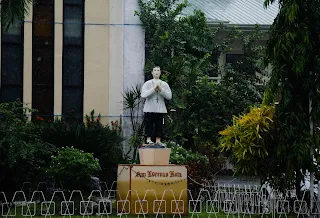St. James the Great Parish in Buenavista, Agusan del Norte, was established in 1937 within the Roman Catholic Diocese of Butuan. Its rich history and vibrant community life continue to make it a significant spiritual and cultural landmark in the region.
The exterior of St. James the Great Parish is a captivating sight. The church's architecture blends traditional and contemporary styles, showcasing its long history and the modern influences that have shaped its current form.
 |
 |
 |

|

|
 |
The altar is modern and simplistic.

|

|
 |
 |
 |
 |
St. James the Great, also known as James the Greater, was one of Jesus' closest disciples. He was the brother of John the Apostle and part of Jesus' inner circle, witnessing significant events such as the Transfiguration. St. James is also recognized as the first apostle to be martyred, making his relics particularly venerated.
According to tradition, after St. James' martyrdom in Jerusalem, his followers transported his body to Galicia in Spain. His relics were rediscovered in the 9th century, leading to the establishment of the pilgrimage site of Santiago de Compostela. The journey to this site, known as the Camino de Santiago, has become one of the most famous Christian pilgrimages.
The Cathedral of Santiago de Compostela in Spain is the primary resting place of St. James' relics. Pilgrims from around the world travel here to venerate his bones, seeking spiritual renewal and blessings. The relics of St. James serve as a powerful reminder of the apostle's faith and his enduring influence on Christianity.
In parishes dedicated to St. James the Great, such as St. James the Great Parish in Buenavista, Agusan del Norte, the relics of the apostle hold profound significance. Although the primary relics are in Spain, many churches have secondary relics or items associated with St. James. These relics provide a tangible connection to the early Church and inspire the faithful to live out their faith with the same fervor as the apostle.
In modern times, relics continue to play a vital role in the spiritual lives of Catholics. They are not worshiped, but venerated as holy objects that bring the faithful closer to the saints and, ultimately, to God. For the community at St. James the Great Parish, the presence of relics is a source of spiritual strength and a reminder of their rich Christian heritage.
 |
 |
